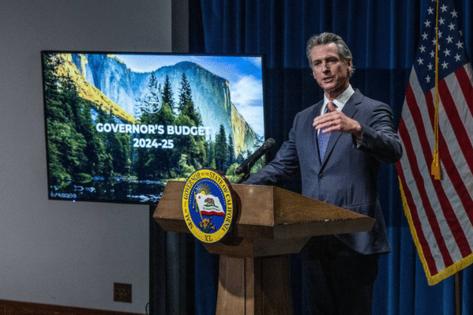California in a jam after borrowing billions to pay unemployment benefits
Published in Business News
California's massive budget deficit, coupled with the state's relatively high level of joblessness, has become a major barrier to reducing the billions of dollars of debt it has incurred to pay unemployment benefits.
The surge in unemployment brought on by the COVID-19 pandemic pushed the state's unemployment insurance trust into insolvency. And over the last year California's joblessness has been on the upswing again, reaching 5.3% in February, the highest among all states. The March job numbers come out Friday.
To keep the safety-net program operating at a time when the taxes paid by employers and earmarked for jobless benefits are insufficient, Sacramento has been borrowing billions of dollars from the federal government. The debt now stands at about $21 billion and growing, an increasing burden for state deficit fighters and for the businesses that pay into the jobless insurance program.
Payroll taxes paid by employers are rising not only to cover payouts to unemployed workers but also a state surcharge and a gradually increasing federal surtax to help pay off the principal on the debt. But the tax increases are not enough to deal with the huge loan the state has incurred, or at least not in any timely manner.
California already has paid more than $650 million in interest on the loan — and another approximately $550 million is due on Sept. 30.
"Businesses are going to continue to see the slow boil eating into their margins," said Robert Moutrie, senior policy advocate for the California Chamber of Commerce.
Higher taxes will hit small and midsize firms in sectors such as restaurants and tourism especially hard, he said.
"It just adds to the burden and the costs of operating here and makes companies look at operating elsewhere," Moutrie said.
While the pandemic is largely to blame for California's huge unemployment insurance debt — and there's been a lot of attention on dollars lost to fraud — analysts and workers' rights groups point to another problem: Even during more-normal economic times, the state often doesn't collect enough unemployment insurance taxes to cover jobless claims.
"The root problem really is that for decades policymakers haven't been requiring businesses to pay enough into the [unemployment insurance] fund to support the benefits workers really need," said Amy Traub, senior researcher and policy analyst at the National Employment Law Project.
...continued
©2024 Los Angeles Times. Visit at latimes.com. Distributed by Tribune Content Agency, LLC.







Comments